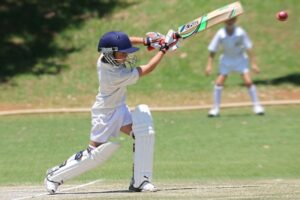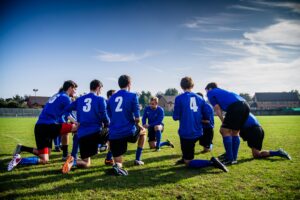Introduction:
Living a healthy and active lifestyle is essential for overall well-being, and one way to achieve this is by embracing a “sports fit” mindset. Incorporating sports and fitness into our daily routine can have a profound impact on our physical, mental, and emotional health. In this blog post, we will explore the significance of being “sports fit” and how it can positively influence various aspects of our lives.
Importance of Being Sports Fit
Enhanced Physical Health:
Engaging in regular physical activities and sports keeps our bodies in optimal condition. A “sports fit” lifestyle helps in improving cardiovascular health, enhancing muscle strength, and promoting flexibility.
Mental Well-being:
Physical activity is not only beneficial for the body but also for the mind. Regular exercise and sports can reduce stress, anxiety, and depression, leading to improved mental well-being. When we are “sports fit,” we often experience heightened levels of happiness and satisfaction.
Weight Management:
Staying “sports fit” contributes to maintaining a healthy weight. Physical activities and sports help burn calories and fat, promoting weight loss and preventing obesity-related issues.
Increased Energy Levels:
Engaging in sports and fitness routines boosts energy levels and combats feelings of lethargy. Being “sports fit” allows us to accomplish daily tasks with vigour and vitality.
Incorporating Sports Fit Lifestyle
Choosing the Right Sport:
To become “sports fit,” it’s essential to find a sport that aligns with your interests and abilities. Whether it’s swimming, running, cycling, or a team sport like soccer, find what excites you and motivates you to stay active.
Setting Realistic Goals:
Setting achievable goals is crucial in the journey to becoming “sports fit.” Whether it’s completing a certain distance in a run or mastering a specific skill in a sport, having clear objectives keeps you motivated and on track.
Establishing a Routine:
Consistency is key when striving to be “sports fit.” Create a routine that incorporates regular exercise and sports activities. Having a structured schedule ensures you prioritize fitness in your daily life.
Balanced Diet:
A balanced diet complements a “sports fit” lifestyle. Fueling your body with the right nutrients is essential for optimal performance and recovery during sports and physical activities.
Sports Fit: A Lifestyle Choice
Building Endurance:
Engaging in sports and fitness activities regularly helps in building endurance. Increased endurance allows you to push your limits and achieve new milestones, making you more “sports fit.”
Boosting Confidence:
Achieving fitness goals and excelling in sports can significantly boost self-confidence. Being “sports fit” instils a sense of accomplishment and pride in one’s abilities.
Social Interaction:
Participating in sports often involves interaction with others, fostering a sense of community and camaraderie. Being part of a sports team or a fitness group can enhance your “sports fit” journey.
Adapting to Challenges:
Sports teach us resilience and the ability to adapt to challenges. The journey to becoming “sports fit” often includes overcoming obstacles, leading to personal growth and development.
Importance of a well-rounded approach to achieve your fitness goals.
- Physical Conditioning
Strength Training
Strength training involves resistance exercises to build muscle mass and increase strength. Incorporating a variety of exercises, such as weightlifting, bodyweight exercises, and resistance bands, can help athletes improve their power and explosiveness.
Cardiovascular Conditioning
Cardiovascular exercises, like running, cycling, and swimming, enhance endurance and stamina. Aerobic workouts boost cardiovascular health, increase lung capacity, and support efficient oxygen utilization during physical activities.
Flexibility and Mobility
Flexibility exercises, including stretching and yoga, enhance range of motion and reduce the risk of injuries. Mobility exercises focus on joint health and functional movement, vital for sports that require agility and quick directional changes.
- Nutrition for Sports Fitness
Balanced Diet
A well-rounded diet comprising carbohydrates, proteins, healthy fats, vitamins, and minerals is crucial for fueling the body and aiding recovery. Carbohydrates provide energy, proteins repair and build muscles, and fats support hormone production and overall health.
Hydration
Staying hydrated is essential for optimal performance and preventing dehydration, which can lead to fatigue and reduced stamina. Athletes should consume adequate water before, during, and after workouts or games.
Supplements
Supplements like protein powder, creatine, and vitamins can complement a balanced diet to meet specific nutritional needs. However, it’s essential to consult a healthcare professional before incorporating supplements into your regimen.
III. Mental Preparation
Goal Setting
Clearly defined short-term and long-term goals provide motivation and a sense of direction. Athletes should set achievable, measurable, and time-bound goals to track progress and maintain focus.
Mental Training Techniques
Techniques like visualization, mindfulness, and breathing exercises help athletes manage stress, enhance concentration, and boost confidence. Mental training is equally important as physical training for achieving peak performance.
- Recovery Techniques
Rest and Sleep
Adequate rest and quality sleep are vital for recovery. Sleep allows the body to repair muscles, replenish energy stores, and regulate hormones essential for athletic performance.
Active Recovery
Engaging in light exercises, stretching, or foam rolling on rest days can improve circulation, reduce muscle soreness, and enhance overall recovery.
Recovery Nutrition
Consuming post-workout meals rich in protein and carbohydrates can aid muscle recovery and replenish glycogen stores.
CASE STUDY ON SPORTS FIT
Case Study 1: “Enhancing Endurance and Performance through Sports Fitness”
Background:
Sarah, a 25-year-old aspiring marathon runner, aimed to improve her endurance and performance to compete in her first full marathon. However, she was facing challenges in maintaining her stamina during long-distance runs and struggled with muscle fatigue.
Approach:
Physical Conditioning:
Sarah began a rigorous training regimen, focusing on long-distance runs, interval training, and cross-training to enhance her cardiovascular fitness and overall endurance.
Strength training exercises were incorporated to build leg muscles, aiding in her ability to maintain a steady pace during the marathon.
Nutrition:
A nutritionist designed a diet plan rich in complex carbohydrates to fuel her runs and adequate protein to aid muscle recovery and growth.
Sarah consumed a balanced diet of lean meats, whole grains, fruits, and vegetables, ensuring she had the energy to endure long training sessions.
Mental Preparation:
Sarah engaged in visualization techniques to mentally prepare for the marathon, envisioning crossing the finish line and achieving her personal best.
She practiced mindfulness and relaxation techniques to manage pre-race nerves and maintain focus during training.
Recovery Techniques:
Sarah prioritized proper rest and sleep to allow her muscles to recover and repair.
She included regular stretching and foam rolling in her routine to alleviate muscle soreness and enhance flexibility.
Outcome:
Sarah successfully completed her first full marathon, achieving a time better than she had anticipated. The integrated approach of physical conditioning, appropriate nutrition, mental preparation, and recovery techniques significantly contributed to her improved endurance and overall performance.
Case Study 2: “Injury Prevention and Rehabilitation in Sports Fitness”
Background:
Michael, a 30-year-old amateur basketball player, suffered a severe ankle injury during a game, hindering his mobility and affecting his confidence to return to the sport.
Approach:
Physical Conditioning:
Michael underwent physiotherapy to strengthen his ankle muscles and improve range of motion.
The physiotherapist designed a personalized exercise program focusing on ankle stability, flexibility, and strength.
Nutrition:
A nutritionist designed a diet to support the healing process, emphasizing foods rich in vitamins and minerals that promote bone and tissue recovery.
Adequate protein intake was emphasized to aid in the repair and regeneration of damaged tissues.
Mental Preparation:
Michael worked with a sports psychologist to overcome the fear of reinjury and regain confidence in his ability to play basketball again.
Techniques such as positive visualization and goal setting were employed to help Michael regain mental strength and motivation.
Recovery Techniques:
Michael followed a structured rehabilitation plan that included gradual return to activity and monitored rest periods to prevent overexertion and potential reinjury.
Cold compression therapy was utilized to manage inflammation and swelling, aiding in the healing process.
Outcome:
Through diligent rehabilitation and a comprehensive approach to sports fitness, Michael successfully recovered from his ankle injury. He returned to basketball stronger, more confident, and equipped with preventive measures to minimize the risk of future injuries.
These case studies highlight the importance of a holistic approach to sports fitness, incorporating physical conditioning, nutrition, mental preparation, and recovery techniques to achieve desired athletic goals and prevent injuries.
Conclusion
In conclusion, sports fitness embodies a holistic approach that extends beyond physical prowess, encompassing mental resilience, nutritional balance, and strategic recovery. It is a journey of discipline, dedication, and determination, where the fusion of optimal physical conditioning, a well-balanced diet, strong mental fortitude, and deliberate recovery strategies amplifies an athlete’s potential. The intertwining elements of physical training, nutrition, mental preparation, and recovery create a symphony, propelling athletes towards achieving their goals and pushing their limits. Sports fitness not only improves athletic performance but cultivates a mindset of perseverance, ultimately leading to a fulfilling and successful athletic journey, regardless of the level of competition or personal aspirations.
In conclusion, sports fitness embodies a holistic approach that extends beyond physical prowess, encompassing mental resilience, nutritional balance, and strategic recovery. It is a journey of discipline, dedication, and determination, where the fusion of optimal physical conditioning, a well-balanced diet, strong mental fortitude, and deliberate recovery strategies amplifies an athlete’s potential. The intertwining elements of physical training, nutrition, mental preparation, and recovery create a symphony, propelling athletes towards achieving their goals and pushing their limits. Sports fitness not only improves athletic performance but cultivates a mindset of perseverance, ultimately leading to a fulfilling and successful athletic journey, regardless of the level of competition or personal aspirations.
